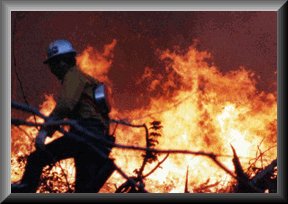
|
NWSA Training Certification Program
|
Training Program:  The objective of NWSA is to provide wildland fire suppression resources that meet or exceed all training, experience, and physical fitness standards identified in the National Wildfire Coordinating Group (NWCG), Wildland Qualifications System Guide (PMS 310-1). The objective of NWSA is to provide wildland fire suppression resources that meet or exceed all training, experience, and physical fitness standards identified in the National Wildfire Coordinating Group (NWCG), Wildland Qualifications System Guide (PMS 310-1).
In February 1994 NWCG issued a position paper on Training Qualifications and Certification for Non-NWCG Entities. This NWCG position paper provided guidance to member agencies, private sector contractors, and educational institutions in order to establish and maintain similar standards within legal and contractual constraints. Two important NWCG recommendations were the Memorandums of Understanding with the contract associations and certification of private sector instructors. NWSA has a Memorandum of Understanding (MOU) with the Southwest region U.S. Forest Service and the Pacific Northwest Wildfire Coordinating Group . The Northern Rockies Coordinating group has MOU's with individual training providers. These agreements formalize training and support arrangements between NWCG Members and recognized contractor associations. NWSA follows the current standards established in the NWCG Course Coordinator?s Guide (PMS 907) and the Field Managers Course Guide (PMS 901-1) for certification of instructors. The NWCG has established the following general instructor levels: - Lead Instructors
- Unit Instructors
- Adjunct Instructors
- Technical Experts
Lead Instructors - Lead instructors must have sufficient experience in presenting all units of the course to be capable of last-minute substitution for unit instructors. It is recognized that exceptions may occur where courses are of such a technical nature that no one person may be technically competent to instruct all units.>
- Lead instructors are required to have 32 hours of instructor training (Facilitative Instructor, M-410 or equivalent course).
- Must be position qualified at the next higher job level of the course they are teaching.
- In addition the person must have five years of teaching experience, and quality fire experience, documented by individual incident performance ratings.
- Lead Instructors can teach the 100 and 200 level courses, and some are qualified to teach 300-level and higher courses. Lead Instructors are certified for individual courses based on requirements in the Field Managers Course Guide.
Unit Instructors - Unit instructors must be experienced in the lesson content they are presenting.
- Unit Instructors can teach / assist the Lead Instructors with 100 and 200-level courses. When teaching units of 200 level courses, instructors should have 32 hours of instructor training (M-410).
Adjunct Instructors - Adjunct instructors may be utilized to provide limited instruction in specialized knowledge and skills at the discretion of the Lead Instructor. They must be experienced, proficient, and knowledgeable of current issues in their field of expertise.
- Adjunct instructors or specialist in a specific field or have not met the currency requirements because they have not been on a wildfire incident in the last five years. Most of the instructors have years of fire experience and teaching experience in fire suppression, fire behavior and ICS.
Duties of Lead Instructors: - Lead Instructors must attend annual training and updates to stay current.
- Lead Instructors must notify Training Coordinator of class time and location in advance of training.
- Lead Instructors must use the NWSA data base to document all persons trained.
- Formal records will be kept on all individuals trained.
- All instructors sign a Code of Ethics.
Training Coordinator: - The Training Coordinator is responsible for certifying instructors and compiling the annual list of current instructors.
- Assist NWSA members with training issues, and advise members of changes in the qualification system.
- Coordinating and teaching NWSA sponsored courses and monitor the quality of the training program.
- Maintain a professional relationship with Agency representatives. Stay current on the latest policy changes and other events that will affect the association and its' members.
- A major emphasis item that is part of all training is promoting safety and a passion that the safe way to perform a task is the only way.
- Training Coordinator reserves the right to attend any and all training given by NWSA Instructors.
- The Training Coordinator is supported by a Training Committee of six instructors, elected by the NWSA instructors at the Annual Meeting.
Carding System and Data Base of NWSA: - Complementing the training program is a Data Base and Incident Qualification Card System.
- Incident Qualification Cards are issued yearly, with a photo ID, employee number, incident qualifications, additional skills, physical fitness rating, incident position needs, and years of experience. Signed by a Lead Instructor and company representative with company name.
- Instructor Records: Database must, as a minimum, contain fields that document Instructor Qualifications and teaching history.
- Firefighter Records: Database must, as a minimum, contain fields that document firefighters Qualifications, Training, Experience, Task Books and Fitness Level
- Instructors are responsible for Data Base input.
- All Data must be paid for when entered.
- Information is confidential.
- Members: $12.00/ person for carded classes.
- Members/Non Members: $5.00 person for non carded classes
- Non Members: $30.00/ person
- Large groups (100 or more) such as National Guard Training should contact Executive Secretary for price information.
- Government Agencies through the Data Base Coordinator, can access a firefighters, name, qualifications and employer. All other information is confidential.
Email Questions to NWSA Training Coordinator at kunzmansw@aol.com March 28, 2005
|
|